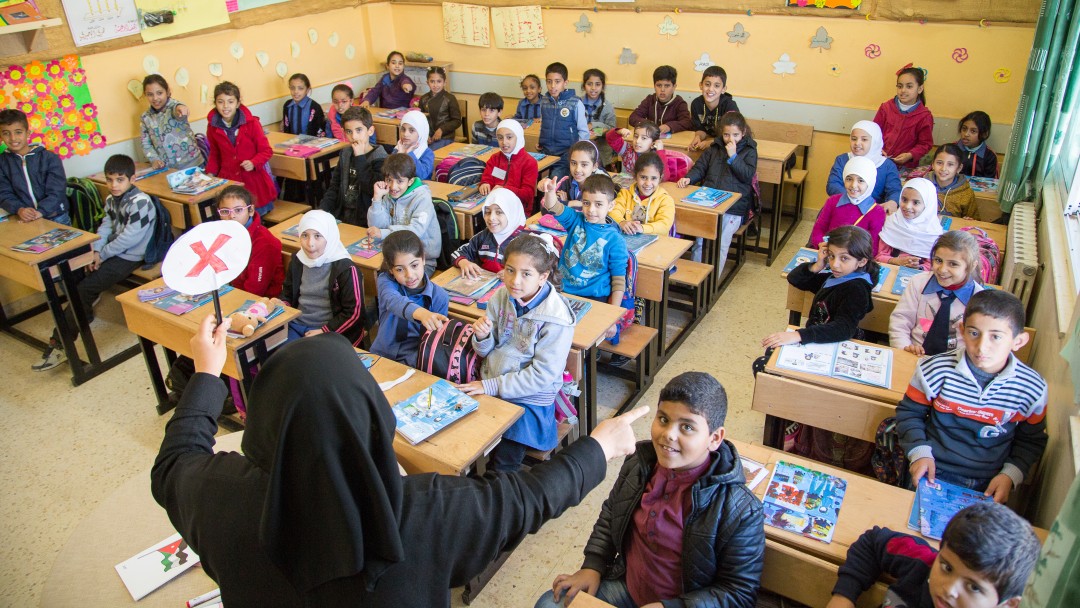News from 2019-06-19 / KfW Development Bank
World Refugee Day: calling attention to 70 million people who have fled their homes

For almost twenty years, various events have been organised worldwide on 20 June – World Refugee Day – under the aegis of the United Nations High Commissioner for Refugees (UNHCR), to express solidarity with people forced to flee their homes. More than 70 million people around the world have been forcibly displaced, which is 2.3 million more than in the previous year. Half of these refugees are children under the age of 18. The largest group continues to be Syrians: at the end of 2018, 6,700,000 had fled or been displaced.
The figures are also reflected in the work of KfW Development Bank: 128 refugee-related projects in 29 countries with a total volume of EUR 4.1 billion are currently underway. The range extends from short-term food supplies via the World Food Programme to job creation measures and improvements to drinking water supply facilities in refugee camps and host communities.
Regional focus: the Middle East
The Middle East is the regional focus of KfW's involvement (EUR 2.6 billion, i.e. 63% of the current portfolio), in particular Syria and its neighbours Jordan, Lebanon, Turkey and Iraq. KfW Development Bank often works in a crisis context with UN organisations or non-governmental organisations. They are generally characterised by a strong local presence and proximity to the target group, which enables the measures they take to have a rapid effect.
There are currently 664,330 Syrian refugees officially registered in Jordan, while estimates suggest the number of refugees is twice as high. 123,372 live in refugee camps, the others have found refuge in communities. These communities – and their infrastructure facilities, such as schools, water supply, electricity and health stations – are often severely strained by the high population growth. To strengthen local willingness to accept refugees and prevent conflicts between the local population and refugees, KfW is involved on behalf of the German Federal Government in the areas of water and sanitation, energy supply, education and job creation.
Jobs in cleaning and maintaining schools in Jordan
One example of a project involves the situation that public schools in Jordan are overburdened – also due to the influx of refugees – and children are often taught in double shifts. Within the scope of German-Jordanian cooperation, 37 primary schools have already been built for around 23,700 girls and boys over the past 15 years – but demand remains high. On top of that, maintenance of the buildings and the school grounds is inadequate. There is a lack of a coherent system and sufficient budget for the proper maintenance of public schools. This has a negative impact on the learning environment, which in turn has consequences for learning behaviour and success. At the same time, there are not enough jobs for refugees or locals. The programme Labour-intensive Maintenance in Public Areas in Jordan, which is being implemented in cooperation with UNOPS (United Nations Office for Project Services), addresses both situations and complements the bilateral projects in school construction of recent years. Maintenance and cleaning jobs are being created for refugees (at least half of the workforce) and Jordanians – and these measures also improve the learning environment. As the executing agency, UNOPS coordinates closely with the Ministry of Education, selects schools, assigns the work to local construction companies, supervises and pays the Syrian and Jordanian workers and monitors compliance with labour and safety standards.
Further information on this topic can be found in our Dossier Flight and integration.

Share page
To share the content of this page with your network, click on one of the icons below.
Note on data protection: When you share content, your personal data is transferred to the selected network.
Data protection
Alternatively, you can also copy the short link: https://www.kfw-entwicklungsbank.de/s/enzBWrMC.CA_A
Copy link Link copied